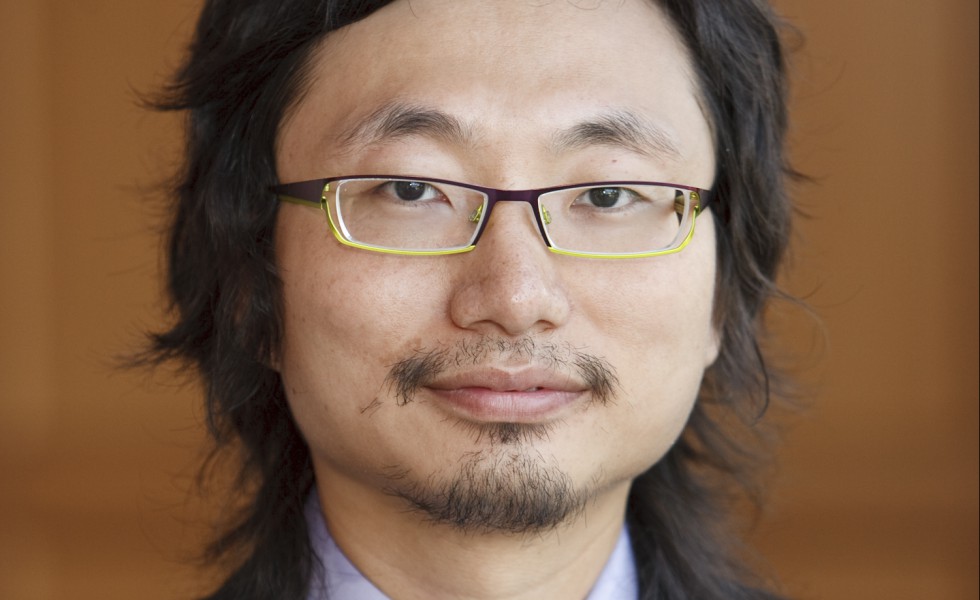
The Assertive Vegetarian

Documentary film director, Jian Yi
This blog entry was originally written by What’s For Dinner? director Jian Yi on a train ride to Beijing on World Vegetarian Day (October 1) 2014.
What’s For Dinner? and Vegucated have had six successful screenings in Guangzhou. Much gratitude is due to the efforts of our friends at GAFA, Young City, Yi’he Vegetarian Restaurant, the Guangzhou Academy of Fine Arts, the South China Normal University, the South China University of Technology, and the Guangdong Food and Drug Vocational School.
My arrival in Beijing today coincided with this year’s World Vegetarian Day. Restaurants and snack bars populate the modern, spacious waiting hall of the Guangzhou South train station. And yet not one offers a hot vegetarian breakfast. Every neatly packaged bun sold in the convenience stores contains meat, and the situation is no different at the fast food restaurants. Perhaps you will say that McDonald’s does not traditionally offer vegetarian food? But McDonald’s traditionally does not offer fried Chinese bread sticks either; a fact which does not seem to stop them from being sold at Guangzhou South station.
When I travel, I seek out vegetarian food on trains, at stations, or in restaurants, with a clear insistence on plant-based ingredients, and people often misperceive me as Hui because of this behavior. The reasons behind the misperception are complex because of the long-standing religious, ethnic, and political issues in China. As the most widespread ethnic minority in China, most Hui are Muslim, and their special diet is widely accepted and respected.
To be perceived as Hui for actively seeking vegetarian food tells a sad but important tale about our society, which is that only Hui Muslims are perceived to be serious about diet, to be clear and articulate about their dietary rights, to request the respect of society. Halal food is therefore available across the market and at universities, though the Hui population does not necessarily outnumber vegetarians. Many of us vegetarians tend to acquiesce to the status quo with the utterance, “let things be”. This takes us away from what vegetarianism really means. The utterance, “let things be”, despite the many situations in which it is an apt saying, too often veils our laziness, cowardice, and helplessness. Becoming vegetarian is an active choice to advocate a compassionate lifestyle. Time after time, we have squandered opportunities to influence the market as well as public policy. This is perhaps why our society and market, of which Guangzhou South station is so emblematic, remain so unfriendly to vegetarians in 2014. It is also why the social infrastructure for vegetarians is stagnant and inadequate, despite a burgeoning vegetarian population.
On a personal level, vegetarianism is an innermost choice. On a public level, it is a civic and consumer right. As vegetarians who are also citizens and consumers, we should cultivate our awareness of such rights. I hope that as individuals joined by our dietary commitment, we will not give up. Considering this change will not happen overnight, we must take hold of every opportunity to demand, to negotiate, to articulate with clarity and poise, to request that vendors serve vegetarian food, to request that society respect vegetarianism. The market can be very snobbish: when our voices are raised in large numbers, it will no longer be able to discount us; it will be forced to react. Vegetarians must learn to be like Hui, to be clear and outright about our dietary habits. Only then can we be respected and valued by the government and market of this country.
Every day, every minute, innumerable farm animals endure torture and death; our health, the health of our children, and the health of our planet are relentlessly assaulted by industrial animal agriculture. Vegetarianism is not a panacea to the world’s problems, but it is a choice to live in a way less damaging, and less violent. It is a basis for a responsible and caring life. Nonetheless it is only a basis, and not a final victory. In every moment our environment calls upon our assertiveness, our perseverance, and our optimism.
Vegetarianism is not a passive state of being. It is rather an unending spiritual path, on which every meal is an opportunity to contemplate one’s relationship with food, as well as with the world at large, towards a true appreciation of Life’s core value and meaning.
When we choose to become vegetarian, we enter a covenant with ourselves, with Life, and with nature, a covenant of non-violence and equality. Recently, I compared the commitment to a vegetarian lifestyle to the commitment of marriage. Getting married does not guarantee, “till death do us part”. Marriage is a journey taken in the name of love and growth. It is a path that we tread in each moment of cognizance, perseverance, gratitude, commiseration, and understanding. So it is with the vegetarian life.
There is not one day worth giving up. In every moment, we must do our best. There is no final victory. Every day, every moment, we need to win it.
Translation by Lucas Tse and Jian Yi (courtesy of IFChina Original Studio)
 Brighter Green
Brighter Green



